![]() The March for Peace — 9/11/18
The March for Peace — 9/11/18
By Alemayehu G, Mariam
Author’s Note: Today, September 11 (12), 2019 is Meskerem1, Ethiopian New Year’s Day (Enqutatash “gift of jewels”).
I wish all Ethiopians a HAPPY, PEACEFUL AND PROSPEROUS MEDEMER NEW YEAR.
Ethiopia uses the Julian calendar consisting of 12 months of 30 days with a 5 or 6 day “13th month” (leap year, this year). The Ethiopian calendar is 7 years and 8 months behind the Gregorian calendar which is used in most parts of the world.
In this commentary, I share my best wishes for peace, understanding and prosperity in Ethiopia, Eritrea and the Horn region.
“Those who love peace must learn to organize as effectively as those who love war.” Martin Luther King, Jr.
9/11/2001—A date that shall live in infamy in American history
September 11 is a paradoxical date for me. It is a sad and a happy day.
On the morning of September 11, 2001, a gang of 19 terrorists managed to coordinate four heinous attacks that resulted in the deaths of nearly 3 thousand people and injury to more than 6 thousand. Many hundreds died from 9/11 related illnesses. Damage to property exceeded $10 billion. The criminal mastermind of the terror attacks was killed in May 2010. The U.S. launched a “global war on terrorism” which continues to be waged today. Untold millions of innocents throughout the world continue to suffer the consequences of that vicious act of terror.
Only the survivors of that heinous crime can tell the horror of that day.
On 9/11/2001, I watched the Twin Towers crumbling on television in stunned disbelief.
In denial, I tried to reassure myself I must be watching a sequel to the Towering Inferno.
Alas! The Twin Towers were the real towering inferno!
The genie that came out of the bottle on 9/11 haunts millions of people throughout the world every single day.
9/11 changed America as did 12/7/1941 (the attack on Pearl Harbor and the U.S. entry in WW II).
We shall remember the innocent victims of the terrorist attacks in the U.S. on September 11, 2001.
We shall remember all the innocents throughout the world who became collateral damage in the years following the 9/11 terror attacks.
9/11/2018 – A date that shall live in glory in Ethiopian- Eritrean history
Between 1998-2000, Ethiopia and Eritrea fought a war that resulted in the deaths of an estimated 50,000-100,000 people and displacement of nearly million.
The Ethio-Eritrean conflict inflicted “substantial damage to the economic growth and development of Ethiopia and Eritrea and has led to humanitarian suffering on both sides of the border.”
On September 11, 2018 (Meskerem 1, 2010 E.C.), Ethiopia and Eritrea opened their borders for the first time after a 20-year no-war, no-peace stalemate.
At the center of the prolonged conflict was a dispute over the implementation of the Ethio-Eritrean border arbitration commission decision which sought to “delimit and demarcate the colonial treaty border based on pertinent colonial treaties (1900, 1902 and 1908) and applicable international law.”
On September 11, 2018, I was privileged to accompany H.E. Prime Minister Abiy Ahmed, H.E. Deputy Prime Minister Demeke Mekonnen, H.E. President Isaias Afeworki and other government officials during the opening of the borders between Ethiopia and Eritrea in the town of Zalambessa and an area called Bure.
It was an incredibly poignant moment for me.
After an absence of 48 years from Ethiopia and Africa, I had the opportunity of a lifetime to witness live and in person the official opening of the borders between the two countries.![]()
For 20 years, leaders of the two countries exchanged salvos of bitter and acrimonious words. Their soldiers occasionally exchanged volleys of mortar and artillery rounds.
As the African saying goes, “When elephants fight, it is the grass that suffers.”
When the leaders of the two countries locked horns for two decades, the people suffered in unimaginable ways.
Families on both sides of the border suffered enforced separation. They were prevented from even attending funerals. All they could do was watch from a distance in sadness and despair.
There were mass expulsions and deportations of ethnic Eritreans from Ethiopia in flagrant violation of international human rights conventions.
Ethiopia could no longer access the ports of Assab and Massawa and had to seek less favorable alternatives.
Eritrea could not access Ethiopian markets and imports.
The U.S. put Eritrea on the list of countries not cooperating with its anti-terrorism efforts followed by U.N. sanctions.
The Ethio-Eritrea border became a theater of no-war and no-peace, and indeed a theater of the absurd.
Fear and loathing characterized the relationship between the two countries for twenty years.
All that changed in June 2018.
PM Abiy made a surprise game-changing announcement.
He declared Ethiopia will accept a 2000 peace agreement with Eritrea over their disputed borders.
In July 2018, he made a historic official state visit to Eritrea and finally broke the ice.
He received a reception fit for a rock star in Asmara.
After his three-day meeting with President Isaias, PM Abiy announced [auth. translation]:
We have agreed to have our airlines and ports to start working, our people to exchange [freely], our embassies to open and for us to come to Asmara with our families on the weekends and enjoy ourselves. Eritreans can come and visit their families in Ethiopia. The rest of the little items on the agenda we will solve by tearing down the border wall and building bridges. We have torn down the wall at the border and are building a bridge over it.
He said his core message to the people of Eritrea is
Medemer” (synergistically come together as force multipliers for each other). If we [engage in] medemer, we could surmount all [our challenges]. We have a broad range opportunities in Northeast Africa. We have amazing people who are brothers. What we need is to abandon hatred and come together in love in medemer.
Following PM Abiy’s visit, President Isaias traveled to Addis Ababa where the people gave him a reception fit for a rock star.
In his Millennium Hall speech, President Isaias said [auth. translation]:
I wish to express the happiness I feel as I bring the greetings, love and good wishes of the Eritrean people to you. I wish to congratulate you on the historic change you have achieved. Within the framework of our traditional and historic mutually beneficial relationship, we have defeated the conspiracy of those who sought to foster hatred and revenge among us. We are fully determined to now focus on development, prosperity and stability and march forward together in all fields of endeavor. Who, who will dare to ruin our love, sow discord and instability among us, damage us or thwart and destroy our development and progress? We will not allow anyone to [get in our way]. Together, we will recover our losses, work hard together and achieve victory. We will strive for a better future. I am certain of it.
In just a few meetings, the two leaders managed to dissolve the hardened enmity that had kept their countries apart for 20 years.
On September 11, 2018, PM Abiy and President Isaias made history.
They busted down the border wall of hate, death and destruction that had separated them for two decades.
I was a witness at the moment the 20-year old wall was torn down and a new bridge built to reconnect the two peoples for ages to come.
The historic moment occurred at Bure, a desolate arid landscape with little vegetation on the border between Ethiopia and Eritrea and Zalambessa, a town located in Tigray region on the Ethio-Eritrean border.![]()
In the early morning hours of September 11, 2018, we flew from Addis Ababa to Assab where we met up with President Isaias and other government officials. From Assab to Bure was a short helicopter flight. Ethiopian and Eritrean troops lined the dusty road in Bure. We walked a few kilometers to reach the ceremonial site where a jubilant crowd of hundreds awaited with great expectation.
As we walked by, I tried to read the faces of the soldiers who stood at attention. They greeted us with welcoming smiles. Some waved their hands. There was not a hint of tension. PM Abiy and President Isaias walked at pretty good clips as the rest of us tried to keep up with them. Women ululated joyously. We shared traditional bread and water under the canopy as the border opening ceremony was conducted.
Following the Bure ceremony, we flew to Asmara and then to Zalambessa.
The turnout in Zalambessa was incredible.![]()
In my estimation, there were at least ten thousand people and possibly more. Women were out in their best traditional dresses ululating, crying, wiping tears from their faces, singing and waving their hands and the flags of the two countries. The crowd shouted out the names of the two leaders. Throngs of young people followed the vehicles carrying the VIPs to the ceremonial site.
It was truly a joyous event.
For me, it was absolute sensory overload.
It was an overwhelming experience of which I will probably write at length in the future.
The border opening event was also a moment of sober reflection and great expectation for me.
If ever someone had told me I would be present at the opening of the border between Ethiopia and Eritrea, I would have had that person involuntarily committed for psychiatric observation.
There were many poignant moments that gave me pause for reflection.
As I saw PM Abiy and President Isaias walking side by side on the dusty road in Bure to bury the hatchet at the border, I came to understand the futility and absurdity of war.
Is war ever necessary?
I remembered the lines from Robert Graves: “To you who’d read my songs of War/ And only hear of blood and fame,/ I’ll say (you’ve heard it said before)/ “War’s Hell!”
It must have been hell in Bure in February 1999. No one knows for sure how many died in that parched wasteland.
How many were buried or left abandoned in the trackless sand and turned to dust?
Bure is a surreal place. It reminded me of the sun-scorched Death Valley desert in Eastern California.
I tried to imagine the thousands from both sides who died in that desolate desert and their surviving families and loved ones.
What was gained for all the lives lost, for the broken bones and mangled and maimed bodies?
I paused to look for evidence of enmity between the people of Ethiopia and Eritrea in the rocks and sands of Bure.
Dead men speak never. But if only the rocks could speak. What horrors they would have related.
The sands of time speak only in the hourglass and rocks are stone deaf.
Thomas Hobbes opined the rule of human existence in the state of nature was “the war of all against all.”
In two countries that were one for eons, with their civilization that goes back for thousands of years, the rule should be “the peace of all for all.”
When I returned to Ethiopia after nearly five decades, the only greeting I heard everywhere was “Selam neh?” (Are you at peace?) “Selam hun” (stay in peace).
No one ever asked me, “Are you at war?” Nor wished me, “War be upon you.”
It is always “Peace be upon you.”
In my youth, the greeting “Selam Neh” did not exist. For us, it was “Tadias?” (What’s happening?) The response was “Alena!” (the equivalent of “hanging in there”).
I remember a special moment when we were all walking to the ceremonial event venue in Zalambessa.
As I looked back, thousands of people were following them at a distance.
I paused for a moment and asked myself, “Who is really leading this march for peace? Are the people leading the leaders from behind or the leaders leading the people from the front?”
There was no question in my mind that the people were leading the leaders to peace from behind, thousands strong. The two leaders and their officials were being shepherded by the people.
I lapsed poetic. “How beautiful to see the sheep finally herding their shepherds!”
If the two leaders for any reason had wanted to change their minds that day and decided not to go through with it, could they have done so?
I had agonized over the Ethio-Eritrean conflict for a very long time because I have always believed the two people are one and the same.
Kings, princes, presidents, prime ministers and even colonial powers had reasons to divide the two peoples.
I agonized because untold numbers of Ethiopians have died defending Eritrea and untold number of Eritreans have died defending Ethiopia.
If only the dead could speak.
I always hoped (to a point of conviction) peace will reign between Ethiopia and Eritrea in the not too distant future.
But often, my hopes for peace were dashed.
In a 2016 commentary, I vented the leaders of both countries were not having a war, just playing war games of mass distraction.
But I never imagined I would live to see, feel and experience my own prophesy for myself.
In my June 10, 2018 commentary entitled, “Blessed Are the Peacemakers”, I wrote of my deepest wishes for peace between Eritrea and Ethiopia:
The guns silenced, the suffering people of Ethiopia and Eritrea may now speak, shout out, that the two countries hereafter “shall beat their swords into plowshares, and their spears into pruning hooks: nation shall not lift up sword against nation, neither shall they learn war anymore.” Witnessing swords beaten into plowshares is a source of great joy for me.
On September 11, 2018, almost exactly 4 months to the day I wrote that commentary, I was blessed to experience the great joy I yearned as I witnessed the leaders of the two countries officially open their borders, bury their hatchets and take a vow before the world that they will beat their swords into ploughshares and become a beacon of peace for the Horn and the rest of Africa.
All I can say is, “my cup runneth over”.
War and peace
It is said “war is hell”.
I say, “To hell with war.”
What I saw in Bure and Zalambessa on September 11, 2018 was that war can destroy the human body and crush bones, annihilate and lay waste to the landscape, but it can do nothing to the human spirit to survive and thrive in peace.
What was the cause of the war between Ethiopia and Eritrea that resulted in so many deaths?
Was it really about resetting of the colonial border?
Irredentism?
Wounded pride?
One-upmanship?
Brinksmanship?
Gamesmanship?
Revenge?
Peace is not about leaders and what they do or do not.
In history, kings, queens, presidents, prime ministers and generals have started wars but there is nary an example in history where the people rose up on their own and demanded to go to war.
History also shows that those who have started wars are rarely the ones to finish it.
In my view, peace between Ethiopia and Eritrea was inevitable.
I would like to think of the conflict between Ethiopia and Eritrea as a family feud that sometimes gets way out of hand.![]()
Desmond Tutu said, “You don’t choose your family. They are God’s gift to you, as you are to them.”
That I believe is the case in the Ethiopian-Eritrean families.
Ethiopians and Eritreans are God’s gift to each other.
They must come together in a process of atonement, healing and reconciliation.
Ending the no-war, no-peace situation could have taken longer, but it was destined to occur.
That is because the flip side of the peace coin is brotherhood and sisterhood.
Peace is not simply the absence of war. Is the Middle East today at peace or at war?
Peace is not an option for the people of Ethiopia and Eritrea, indeed for the whole Horn region. It is the only thing.
In the words of Dr. Martin Luther King, Jr., the people in the Horn of Africa “must learn to live together as brothers or perish together as fools.”
Regardless of the propaganda of the war and hatemongers, the people of Ethiopian and Eritrea are brothers and sisters who have been manipulated into becoming enemies of each other.
They are part of a single garment of destiny.
To paraphrase Dr. Martin Luther King, Jr., “Ethiopians and Eritreans are caught in an inescapable network of mutuality, tied in a single garment of destiny. Whatever affects one directly, affects all indirectly.”
Put simply, Ethiopians and Eritreans will swim or sink together.
I shall prophesy in a few years Ethiopia and Eritrea will neither swim nor sink.
They shall spread their wings and soar over the borderless African skies to the amazement of all.
The naysayers, the prophets of doom and gloom, the cynics, defeatist, skeptics, pessimists, losers, bellyachers, grumblers, dogmatists, fanatics, bigots and the haters will soon be consigned to the dustbin of history.
Ethiopians and Eritreans do not have a separate racial or ethnic identity or even nationality. Such classifications are “social constructs”, artificial institutions created by societies.
Their natural and irrevocable identity is their humanity.
But their natural identity is infected by the deadly man-made diseases of ethnocentrism, sectarianism, tribalism, nationalism, authoritarianism, chauvinism, dogmatism, egotism, fanaticism, etc.
We must support peace, reconciliation and good relations between the people of Ethiopia and Eritrea not because of their leaders but despite them.
Our support for peace must not be based on our perception of the actions or inactions of the leaders.
Leaders come and go, but the people stay, and as new generations come, the prospect for peace increases.
At the elementary level, peace to me is an existential condition in which people resolve their differences without violence but through dialogue, discussion, negotiation and compromise.
In America, there is a popular slogan of dissent, “No justice, no peace.”
In other words, if there is no justice, there will be violence.
If justice and peace are related, then the rule of law must reign supreme to protect the rights of people.
There must be accountability and political, social, legal and gender equality. The people have a natural right to personal security and equal opportunity to meet their basic needs.
Over the past year, I have mulled over the teachable moments in the Ethio-Eritrean war.
As elementary and obvious the lessons are, they have profound significance for me.
Lesson #1:
Ethiopians and Eritreans are not enemies. They are brothers and sisters. They have family feuds, but what family doesn’t?
Ethiopians and Eritreans are one people divided by misunderstanding, misinformation, miscommunication and miscalculation.
Both peoples have deadly common enemies called poverty, ignorance, disease, bigotry, gender inequality, youth unemployment, etc.
Lesson #2:
The borders between the two countries exist in the minds of people who want to keep the two peoples separate and at each other’s throats. The physical borders are mere reflections of the narrow borders of the minds of those who want to keep the two peoples in a state of fear and loathing. What is the point of having open borders but closed minds? I am greatly inspired by the firm commitment of the two leaders to tear down the mental wall of hate, distrust, suspicion and doubt separating them and build bridges of love, friendship, good will and good faith.
Lesson # 3:
The war of bullets and words must now be replaced by a battle for hearts and minds of the people. Leaders must reach out to the people and engage them in shaping the destines of their countries. The alternative will leave the people in perpetual poverty.
Karl Marx in the 19th century warned, “A specter is haunting Europe—the specter of Communism.”
Today, I would say, “A specter is haunting the world – the specter of globalization.”
In the 19th century, it was the “scramble for Africa”. In the 21st, it is a scramble for the globalization of Africa.
Global inequality is accelerating at breakneck pace. In Africa, millions of people continue to suffer from limited access to education and basic health care services. Africa carries crushing foreign debt, and without some massive debt forgiveness program, I can see only the darkness of poverty and privation at the end of the endless tunnel.
Leaders must create channels for the people to communicate with them. They must listen to the people and engage them in give and take. Leaders not only lead but also teach. The best way to teach the people is by exemplary leadership.
Lesson #4: The future belongs to the youth. The greatest challenge for all leaders in the Horn and throughout Africa is to win the hearts and minds of their youth. While Africa has the youngest population in the world, youth unemployment remains high and the prospect for youth economic development is dismal. Leaders must leave a lasting legacy for the next generation. They must put the interests of the new generation in front of the last. John Donne wrote, “the dust of great persons’ graves is speechless.” Only the changed and improved lives of the youth will speak of the greatness of their leaders. Nations do not die from wars nor live because of peace. They die when their youth lose hope and confidence in their future and live when their youth have faith, optimism and conviction that tomorrow will be better than today and next year better than this year.
Lesson # 5: The only way for Ethiopians and Eritreans to survive and thrive is through Medemer. They can become force multipliers for each other if they work together for mutual benefit. PM Abiy has spoken about his ideas of “Medemer”.
As I explained in my recent commentary, “‘Medemer’” is the road map out of the wilderness of the Valley of Fools in the Horn of Africa.
In that commentary, I speculatively explained how PM Abiy and President Isaias did the impossible.![]()
I concluded as follows:
As goes the Horn of Africa, so goes the rest of Africa.
The Horn is the laboratory, the proving grounds, for all of Africa.
Will there be endless wars and conflicts that will bury the continent in the abyss of poverty?
Are we on the cusp of a new era of collective prosperity and progress that will ensure Africa’s rightful place on the international stage?
If the Horn countries can come together (Medemer), make peace and build the foundation for peaceful and prosperous relations, the rest of Africa will follow in their footsteps.
Wishing all Ethiopians and Eritreans a Happy Prosperous Medemer 2012!
The post 9/11- A Date That Shall Live in Infamy in America and in Glory in Ethiopia and Eritrea appeared first on Satenaw: Ethiopian News/Breaking News: Your right to know!.
 More than two months after Herman Cohen made his unprovoked, depravedly hateful and arrogantly insulting comments about the Amhara people, he has finally issued a twitter apology “about the pain and discomfort he caused in the Amhara community”.
More than two months after Herman Cohen made his unprovoked, depravedly hateful and arrogantly insulting comments about the Amhara people, he has finally issued a twitter apology “about the pain and discomfort he caused in the Amhara community”.

 Jawar, the self-appointed Oromo activist and shallow political analyst, has enraged many people in the Southern region. His close personal and business association with Sidama extremists and his support for their illegal activities has caused so much suffering to the people of the region. Jawar’s flirtation with Sidama extremists and his disdain for the rest of the people in the region has made him the most despised man in the region. Talk to anyone in Awassa about Jawar, and you will observe how quickly the expression on the face of the person changes.
Jawar, the self-appointed Oromo activist and shallow political analyst, has enraged many people in the Southern region. His close personal and business association with Sidama extremists and his support for their illegal activities has caused so much suffering to the people of the region. Jawar’s flirtation with Sidama extremists and his disdain for the rest of the people in the region has made him the most despised man in the region. Talk to anyone in Awassa about Jawar, and you will observe how quickly the expression on the face of the person changes.
 The March for Peace — 9/11/18
The March for Peace — 9/11/18




 Our universities are becoming a place for extremism and intolerance as a result of the unbridled participation of university instructors in politics. University instructors are spending a large chunk of their time and energy licking their political masters’ tails. It is not an exaggeration to say that an entire generation is being sacrificed for cheap political gains. You have university instructors who have been teaching at public universities for more than a decade. These people are dominating the social media and main stream media. You see them almost on daily basis on national and regional TVs. They don’t talk anything new. They are like parrots: they simply repeat what they said year ago. You see them uttering words that you don’t expect from a university instructor. Moreover, they post facebook messages almost on daily basis.
Our universities are becoming a place for extremism and intolerance as a result of the unbridled participation of university instructors in politics. University instructors are spending a large chunk of their time and energy licking their political masters’ tails. It is not an exaggeration to say that an entire generation is being sacrificed for cheap political gains. You have university instructors who have been teaching at public universities for more than a decade. These people are dominating the social media and main stream media. You see them almost on daily basis on national and regional TVs. They don’t talk anything new. They are like parrots: they simply repeat what they said year ago. You see them uttering words that you don’t expect from a university instructor. Moreover, they post facebook messages almost on daily basis.
 We are beginning to see hard evidence of PM Abiy Ahmed’s return on investments in domestic and regional peace initiatives, good governance and structural reforms and his unrelenting campaign to change the global image of Ethiopia as a land of opportunity for citizens and non-citizens alike.
We are beginning to see hard evidence of PM Abiy Ahmed’s return on investments in domestic and regional peace initiatives, good governance and structural reforms and his unrelenting campaign to change the global image of Ethiopia as a land of opportunity for citizens and non-citizens alike.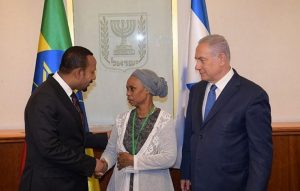
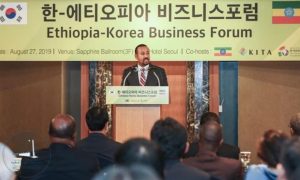
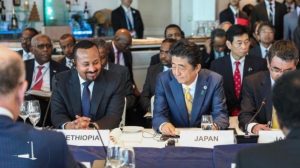




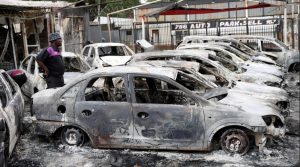
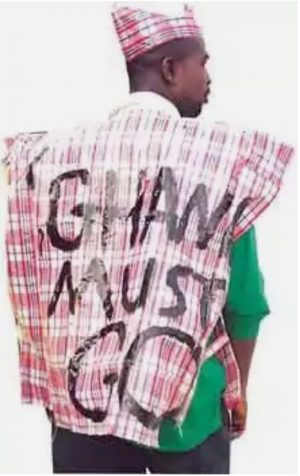
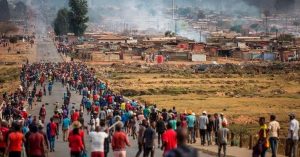
 As usual, you are enjoying New York City while your people are suffering from endless starvation and preventable diseases. Are you here to promote the interests of Africa or to promote your interests? Are you here to solve Africa’s health problems or to look for the best health care providers for you and your families? Are you here to solve Africa’s economic and social problems or to find Western and Eastern banks where you can store the money you robbed? Are you here to talk about freedom of speech or to lobby human right activities and good leaders that accuse you of heinous crimes? Are you here to shop for feasible technology or to shop for jewelry and dresses for you wives and mistresses? Are you here to make sure your voices are heard or to take orders from your superpower masters?
As usual, you are enjoying New York City while your people are suffering from endless starvation and preventable diseases. Are you here to promote the interests of Africa or to promote your interests? Are you here to solve Africa’s health problems or to look for the best health care providers for you and your families? Are you here to solve Africa’s economic and social problems or to find Western and Eastern banks where you can store the money you robbed? Are you here to talk about freedom of speech or to lobby human right activities and good leaders that accuse you of heinous crimes? Are you here to shop for feasible technology or to shop for jewelry and dresses for you wives and mistresses? Are you here to make sure your voices are heard or to take orders from your superpower masters? Taye Bogale is a man with a mission: Search, find, expose, challenge and take down pseudo-intellectuals and frauds, those who parade fairy tales as Ethiopian history, fabricators of falsehoods, empty barrels, political opportunists, self-promoting con-artists with bogus academic acronyms after their names and social media twits, nitwits and dimwits.
Taye Bogale is a man with a mission: Search, find, expose, challenge and take down pseudo-intellectuals and frauds, those who parade fairy tales as Ethiopian history, fabricators of falsehoods, empty barrels, political opportunists, self-promoting con-artists with bogus academic acronyms after their names and social media twits, nitwits and dimwits.
 Last week, Susan Elizabeth Rice, President Obama’s former National Security Advisor and top confidant was ragging on President Donald Trump as the “destroyer of American democracy from within” as she hawked her book “Tough Love” on a talk show. Rice indignantly
Last week, Susan Elizabeth Rice, President Obama’s former National Security Advisor and top confidant was ragging on President Donald Trump as the “destroyer of American democracy from within” as she hawked her book “Tough Love” on a talk show. Rice indignantly 
 He said, :“This is where the Oromo people broken. This is where the humiliation began. This is where his conscious is broken. This is where Tufa Muna and other fighters of that time broken by the Neftegna system. Today we have broken and rooted out who broken us. Oromo honored in its humiliation place. You won Oromo”!
He said, :“This is where the Oromo people broken. This is where the humiliation began. This is where his conscious is broken. This is where Tufa Muna and other fighters of that time broken by the Neftegna system. Today we have broken and rooted out who broken us. Oromo honored in its humiliation place. You won Oromo”! Failing to support the movement will have far-reaching consequences for the people in the ‘free world’, more so for the people under authoritarian regimes throughout the globe that emulate the regime.
Failing to support the movement will have far-reaching consequences for the people in the ‘free world’, more so for the people under authoritarian regimes throughout the globe that emulate the regime. Weeks after Dr. Abiy was selected for premiership – mainly by the Oromo and Amhara ruling party members of the EPRDF – he released hundreds of opposition prisoners and began dialogue with arch rival Eritrea. 20 years after the Ethiopia-Eritrea border war began, Abiy brokered a peace deal with dictator Isaias Afewerki and officially reopened relations with Asmara. Meanwhile, he gave alive branch to previously outlawed opposition groups Oromo Liberation Front (OLF), Patriotic Ginbot 7 (PG7) and Ogaden National Liberation Front (ONLF).
Weeks after Dr. Abiy was selected for premiership – mainly by the Oromo and Amhara ruling party members of the EPRDF – he released hundreds of opposition prisoners and began dialogue with arch rival Eritrea. 20 years after the Ethiopia-Eritrea border war began, Abiy brokered a peace deal with dictator Isaias Afewerki and officially reopened relations with Asmara. Meanwhile, he gave alive branch to previously outlawed opposition groups Oromo Liberation Front (OLF), Patriotic Ginbot 7 (PG7) and Ogaden National Liberation Front (ONLF).